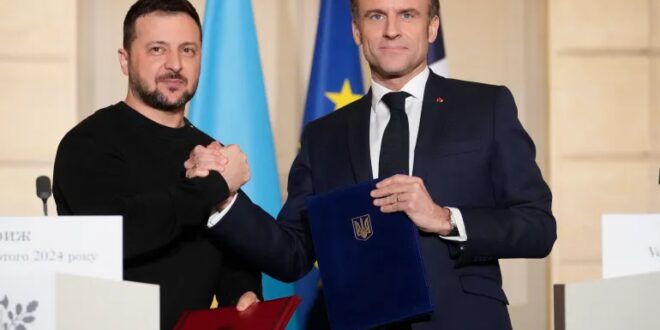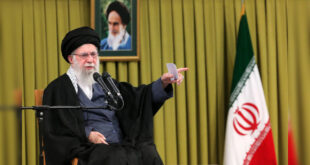The French president has adopted a bellicose stance in recent months, suggesting troops could be sent to Ukraine to fight Russia.
Soon after Russia’s full-scale invasion of Ukraine in February 2022, French President Emmanuel Macron sought to help resolve the conflict diplomatically.
During the war’s first summer, Macron said it was important that Moscow was not humiliated and that a European security order including Russia should be established.
But since last year, Macron has been drastically shifting towards what has been described as a hawkish foreign policy.
At a conference in Paris last month, the French president said a deployment of Western troops to fight Russia on the ground in Ukraine should not be ruled out, a suggestion that angered Russian President Vladimir Putin and was dismissed by Ukraine’s main backers.
While speaking in Prague on March 5, Macron declared that Europeans can’t be “cowards” when countering Moscow.
What explains Macron’s shifting posture?
Macron’s moves come as Ukraine faces serious problems on the battlefield and as United States military support is delayed.
While Ukraine’s main aim is to hold firm in the war, Kyiv’s side lacks manpower while fighting a country with a population three times its own.
Its ammunition shortages are another significant challenge and against the backdrop of an anti-climactic counteroffensive last year, Ukraine is struggling to size up its army.
There are concerns that these conditions will embolden Moscow to act more confidently, not only in Ukraine, but also possibly in Moldova, the South Caucasus, and the Sahel.
Meanwhile, Paris is increasingly concerned about Russia’s hybrid warfare, which has reportedly intensified against France and other European Union members.
“France has been a particular target of hybrid attacks – [for example] cyber, disinformation – recently. This probably helped Macron come to terms with the reality of a more aggressive Russia,” said Mathieu Droin, a visiting fellow in the Europe, Russia, and Eurasia programme at the Center for Strategic and International Studies, and former official at the French Ministry for Europe and Foreign Affairs.
Meanwhile, Macron wants to advance his vision for Europe’s strategic autonomy from Washington and demonstrate Europe’s ability to support Kyiv without counting on the US – especially given the possibility of a second Donald Trump presidency.
“Undoubtedly, concerns about a second Trump presidency have woken Europeans up to the fact that they need to do more for their own defence,” said Artin DerSimonian, a research fellow in the Eurasia programme at the Quincy Institute for Responsible Statecraft. “Such a realisation across the continent plays into Macron’s push for strategic autonomy.”
Growing European autonomy from Washington
Some of Trump’s rhetoric on the campaign trail last month has worried European policymakers.
At an event in South Carolina, he told his audience that he would encourage the Russians to “do whatever the hell they want” to any NATO member which fails to meet spending guidelines.
Macron has consistently warned France’s European partners that the US position on Ukraine has shifted, and that President Joe Biden’s administration “might only be a parenthesis, not a back to normal, in US politics”, said Droin.
“Of course, we welcome [the Americans] any time. We know how dependent we are on [Washington’s] security guarantee. But the fact is we can’t count on it indefinitely any more. This is what many Europeans are realising.
“This is definitely always in the back of [Macron’s] mind.”
While Macron’s talk of sending Western military forces to Ukraine was largely rejected by most of France’s NATO allies, the Baltic countries – Estonia, Latvia and Lithuania – rejoiced, as well as some others in closer geographic proximity to Russia.
Throughout the Russia-Ukraine war, and for many years before it, some Eastern and Central European countries believe that officials in NATO’s Western European members, including France, have been too eager to appease the Kremlin and failed to wake up to an existential threat.
“Macron’s hardened stance – at least rhetorically – on Ukraine may be a further attempt to ameliorate concerns in the east of the continent,” DerSimonian told Al Jazeera. “Whether or not Macron follows through with his rhetoric, he has certainly won favour in the eastern part of the continent, which may likely prove useful in future French strategic plans.”
It “certainly helped in closing ranks”, said Droin.
Excluding exceptions such as Hungary and Slovakia, countries in Eastern and Central Europe are the “most vocal and supportive of Ukraine” and have “warmly welcomed” Macron’s shift, Droin added.
Macron’s shift seemed to start at the end of May last year when he was speaking at a security conference hosted by GLOBSEC, a Bratislava-based think tank.
In a speech, he acknowledged that Paris had failed to sufficiently listen to the concerns of NATO members near Russia and Ukraine.
“He certainly realised that if he wants to build a stronger Europe and a more strategically autonomous Europe, as he usually says, he needs these countries and this is certainly a way to reconcile the two hemispheres of Europe,” said Droin.
 Eurasia Press & News
Eurasia Press & News




